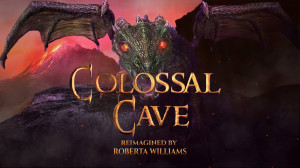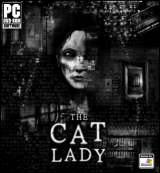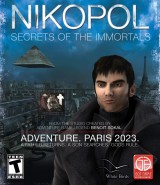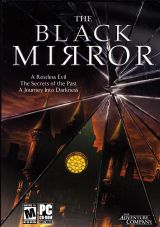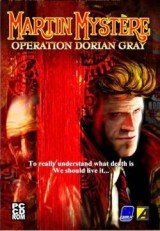Review for Sunday Gold

It might seem strange, at first, to see a graphic adventure game published by Team 17. As a developer, they're most known for the Worms series, and as a publisher, their catalog is almost entirely action games, not plot-heavy, puzzle-solving point-and-clicks. However, when you start playing the genre mash-up, high-octane heist game Sunday Gold, you can immediately see how easily it fits in.
Sunday Gold is a turn-based point-and-click adventure game, which may be a hard combination to picture before you play it. Before I explain the story, I want to lay out what it feels like to play the game. Developer BKOM Studios borrows many mechanics from tactical strategy games to build a unique, kinetic framework that brings something entirely new, yet eerily natural to the genre. Similar to games like X-COM or Advance Wars, your character has a certain number of Action Points to use each “turn.” This game has combat, in which the system works just how you'd expect: Your character doesn't move, but uses their points to attack, guard, or execute a special ability. Once they run out, you end your turn and hope for the best as it's time for the enemies to attack. Outside of combat, the same idea applies: You use your points to do complex actions like searching through a container or talking to someone who might be hostile to you. When you run out of points, you end your turn and time moves forward.
Now, you might be saying to yourself: Combat and timed sequences? Not in my genre! But I'd urge you to hold on for just a moment longer. In many puzzle-y situations, time running out doesn't really matter. If you're digging around an alleyway looking for ways to break back into your favorite bar that you've just been thrown out of, you can take all the time in the world. Where the timing mechanic becomes important, however, is on the dangerous missions you and your team undertake. Suppose you're in the middle of a heist. In that case, you need to consider every move you make because each turn you take rummaging around for clues and inventory items is another chunk of time for Security to discover you're there.
You start the game as Frank, a foul-mouthed mercenary, always ready with a quip and clearly in a bad way. He's been thrown out of his favorite pub and immediately learns that he has some heavy debts that are due immediately. Thankfully, his good pal Sally, a quick-witted bruiser built like a football player, has a lead on a new job. Here we get acquainted with the game's mechanics. As you hover your mouse around the screen, each interactable object is highlighted in a heavy yellow outline, and if you click on one, a list of verbs will pop up. You can “Move To” or “Examine” pretty much everything, but occasionally other verbs like “Search” and “Talk” will pop up with a number and the letters “AP” next to them. This indicates the amount of Action Points each of these will take. Once you're out of Action Points, you have to end your turn. You can go over your allotted amount, but you will take a penalty on your next go-round.
The puzzles will be familiar to your average adventure gamer. You have to trick people into letting you take their stuff, create distractions to sneak into places, or find weird inventory items to use in interesting ways. As you get further into the game, Sunday Gold utilizes escape-room-style puzzles, requiring you to put your brain to work guessing passwords and solving sequence challenges based on clues you dig up. The game also allows for multiple paths and solutions to different puzzles. Treating someone poorly early in the game may affect how they react to you later. The differences are too small to make your experience wildly different every play-through, but they're enough to make the game feel alive and interesting.
Once you make it into the pub and catch up with Sally, you add a third member to your team – a neurotic (read: psychotic) tech genius named Gavin – and you learn a bit more about the world. You're in a semi-futuristic version of London, run by billionaire tech giants and you and your pals are a gang of underworld anti-heroes, planning heists to make a living. From here on out, you're a team. Instead of just one character to fight and explore, you're controlling three. Each person has their own abilities and weaknesses both in and out of combat. Also, in the exploration sections, you don't have to end your turn until all three run out of AP, allowing you much more flexibility in your adventuring. You can use your inventory screen to trade items between characters, equip weapons, armor, or body modification technology, and use consumables like medicine or hard drugs to gain more AP or health.
In combat, you control all the characters in your party opposing whatever enemies you're facing. The game shows you a long string of portraits above the action to indicate the turn order. Faster characters may have two or even three opportunities before other characters get one. Once each turn, each person can take one action. They can adopt a standard attack or use a special ability, which costs more AP, but can either do more damage, hit more targets, or heal or buff allies. They can also use their turn to guard, greatly reducing incoming damage until their next turn, or use an item. Damage works like a big rock/paper/scissors game. Different enemies have resistances and weaknesses, and you want to match up your attacks to do the most damage possible while ensuring you are guarded if you're vulnerable to the enemy's damage type.
Another interesting aspect of the game is the composure system. Every character has a composure meter which can decrease when stressful things happen both in and out of combat. If their composure sinks too low, they can freak out and start missing turns or even attacking their teammates. This can be controlled with consumables like booze, winning fights, or utilizing Frank's leadership credentials. After winning a battle or solving a puzzle, you gain experience points and can eventually level up, allowing you to unlock new abilities and buff up your skills.
Each character also has a unique expertise for solving certain types of puzzles. Sally is super-strong, Frank can pick locks, and Gavin can hack computers. Each of these has a correlating mini-game that gets easier or harder depending on the difficulty of the task and the amount of skill points you've invested in that particular skill when you level your character up. If you fail a mini-game, you generally cannot try it again and may miss out on shortcuts, loot, or story opportunities, facing the consequences down the road. You might fail to break open a door and so have to fight your way down another route, or fail to hack a camera and miss a clue that would have made some later puzzle a little easier. Two of the three mini-games rely on the player's quick reflexes. Still, for players who have trouble with twitchy hand-eye coordination, the game has an accessibility function to lower the difficulty considerably. Plus, the game has no real dead-ends, so you'll avoid locking yourself out of an ending. Sunday Gold also has both autosaves and manual saves, so nothing is stopping you from save-scumming your way through a challenge.
There's a lot of mechanical stuff to grasp, but the game really eases you into every new idea. Nothing was difficult to learn, even if some things, like the combat or the mini-games, were tough to master. One of the most impressive things about Sunday Gold is that all these disparate elements fit together perfectly. The transition from one thing to another is smooth and exciting, giving you the tense and adrenaline-fueled feeling of being on an actual heist yourself.
This feeling is helped along immensely by the artwork. The backgrounds are beautiful scenes of futuristic dinginess, from rainy city alleyways to blood-spattered offices. Each scene is lit by harsh light from glowing computer screens, neon signs, or future technology. You look at your characters in third person in a just-barely-isometric view, and when they perform actions, the screen flashes a bit of static and suddenly reveals where you want them to go. There is some animation, the characters swaying back and forth as they stand around, but much of the major activity takes place in these pops of static.
The cut-scenes utilize comic-book-style art, with panels popping up one after another to simulate an animated motion or show you the action in moment-to-moment snapshots. Poses are exaggerated to capture an impressionistic feeling of each instant, rather than a realistic portrayal. Guns seems to be extending out of the screen towards you, a powerful punch is highlighted by bright bursts of color radiating from the blow and punctuated by a classic comic book “POW!” in the foreground. Everything is sharp and fast and energetic, using jump cuts and dramatic angles to glue you to the screen and keep you pumped for each new moment.
The story is also incredibly exciting and gripping from start to finish. Your little band of criminals finds themselves pitted against the evils of capitalism, pulling themselves up from a group of selfish mercenaries to three little Robin Hoods. The game has a lot to say about the use of anarchy to combat Ayn Randian individualism. It put me in mind of Disco Elysium, for while the political ideas don't hit quite as hard, and the writing isn't quite as sharp, it still combines the feeling of a rollicking tabletop RPG adventure with an exploration of deeper political and social ideas that will leave you pondering long after you put the game down.
My biggest gripe with Sunday Gold is that the battles can be exhausting and lengthy, without too much variety either within or between them. And your Action Points are carried from exploration to combat mode and back, so a poor battle can result in a horrible loop. If you barely scrape through a fight with little health or AP, you might find yourself back in explore mode and wanting to heal up. You could use what little AP you have left to heal and then end your turn to refresh your point. In a heist, ending your turn can raise the “alert level,” increasing the chance that enemies show up, looking for a fight. And so you can go back and forth between barely scraping through a fight and alerting more guards a few times before you get yourself back to a comfortable level of health and Action Points.
The other big issue with the game is the length. It takes about 10-12 hours, which is certainly not a short game by adventure game metrics. However, the complex systems that Sunday Gold builds need to be more utilized. The level cap is 10, leaving most skills unexplored. By the time the game ends, it feels like we've barely scraped the surface of the characters or the world. The game creates a lush and engaging playground, gets you comfortable and excited to explore, and then rolls credits. This may have opened the door for a sequel or added DLC, but the game itself felt like half of what I wanted it to be.
Despite these minor flaws, Sunday Gold surprised me with its expert blending of tactical RPG elements with a point-and-click adventure. The characters leap off the screen with wit and personality, cementing themselves into your memory and making you want to spend more time with them. The game tells a fun, exciting story with bold, exciting visuals to match. It's just, all in all, a gutsy swing of an idea that really connects. In a genre that can often feel hemmed in by convention and tradition, it's always refreshing to see someone build something new without pulling any punches while they do it. While the combat might turn some adventure game fans away, Sunday Gold is a game that all adventure fans should experience for themselves.
















